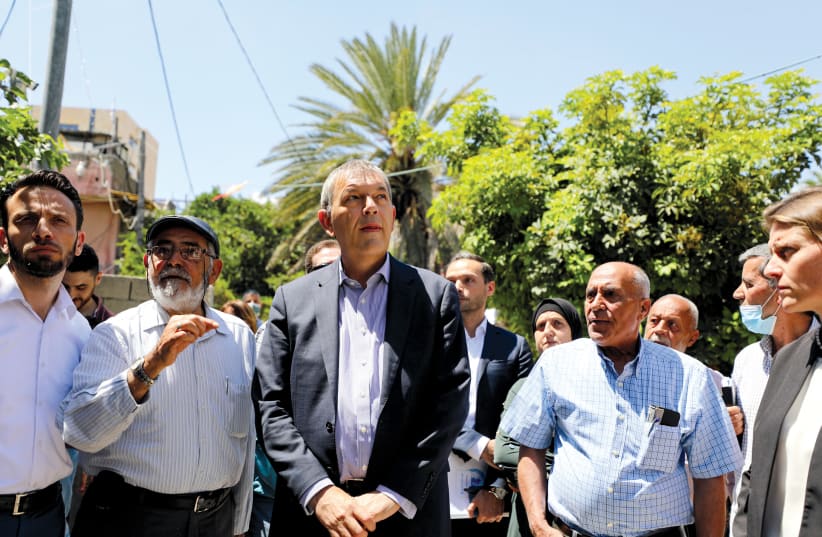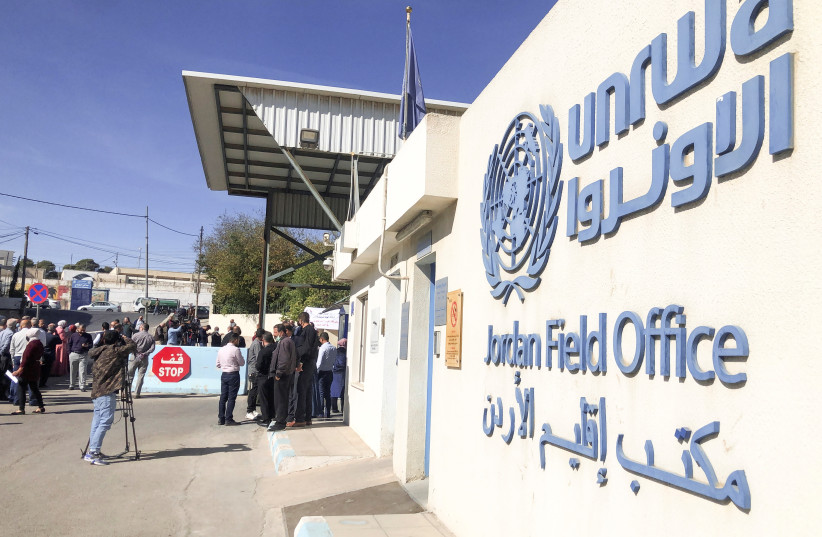On Tuesday the United Nations Relief and Works Agency (UNRWA), the UN group which is (theoretically) responsible for handling the welfare of Palestinian refugees, announced that the organization is facing a financial crisis and is “on the brink of collapse.” The statement came on the heels of an international fundraising conference that failed to come anywhere close to its goal of covering UNRWA’s annual shortfall, and a day after Commissioner-General Philippe Lazzarini appeared before the agency’s Advisory Commission expressing shock and indignation at the fact that he had to “beg” for money to meet his bloated budget.
Lazzarini should not be so surprised that the world is reluctant to continue bailing out his ever-sinking ship. It is high time that countries stop using periodic financial interventions to gloss over the very valid reasons why the organization is failing in the first place. For the sake of the Palestinian people that it was originally intended to serve, UNRWA deserves to be put out of its misery.
The original idea behind UNRWA was sound. It was founded in 1949 for “the alleviation of the conditions of starvation and distress among the Palestine refugees” from the 1948-49 Arab-Israeli War. From the beginning, the agency defined Palestinian refugees as “persons whose normal place of residence was Palestine during the period of June 1, 1946 to May 15, 1948, and who lost both home and means of livelihood as a result of the 1948 conflict.” But in 1965, UNRWA unilaterally changed the eligibility requirements to include third-generation descendants. It did so again in 1982, this time redefining “refugees” to include all descendants of Palestine refugee males, regardless of whether they had been granted citizenship elsewhere.
UNRWA’s current definition is utterly inconsistent with how all other refugees are classified, including by the United Nations High Commissioner for Refugees (UNHCR), the agency responsible for every other (non-Palestinian) refugee on the planet. For example, under Article I(c)(3) of the UN Convention and Protocol Relating to the Status of Refugees, a person is no longer a refugee if he or she has “acquired a new nationality.” UNRWA’s definition, which is not anchored in treaty but was invented by the organization itself, contains no similar provision. According to one expert, 99% of UNRWA’s 5.7 million “refugees” are not actually refugees at all under the standard definition of that term, while others put that number even higher.
And the differences in agencies are not just definitional. Since its inception, UNHCR has managed to resettle tens of millions of people globally, while UNRWA has resettled – no one. In fact, (using their own numbers) the problem of Palestinian refugees has grown exponentially worse on UNRWA’s watch, despite the fact that they spend roughly four times the amount per refugee that UNHCR does, with over 30,000 personnel (nearly double UNHCR) and a $1.4 billion budget that is almost four times UNHCR’s. Of course those numbers are less surprising when you consider the serious abuses of power, including sexual misconduct, nepotism, bullying and retaliation, that its leadership have been accused of.
UNRWA claims to advocate for a just and lasting solution to the Israeli-Palestinian conflict, but in practice the agency has overlooked terrorist group activity in some of its camps, allowed its schools to be used as human shields for Hamas military tunnels, allowed members of Hamas and other terrorist groups to hold UNRWA staff positions, falsely presented images that stir up hatred against Israel and continues to teach children to demonize and delegitimize Israel using violent propaganda. In short, UNRWA spends more to do less, while perpetuating a problem it was meant to resolve and undermining the peace process itself. That is why some countries, like Germany and the UK, have cut their funding in the first place.
The UN is often, and deservedly, criticized for singling out the State of Israel. But if the nations of the world want to actually help solve the Middle East conflict, they need to stop singling out the Palestinians as well.
Perhaps the UN should support the resettlement of Palestinian refugees – but they should do so only within a framework that would: a) not falsely blame the situation entirely on Israel, and b) involve even trying to accomplish the goal of resettling actual refugees from the Arab-Israeli conflict of 1948, using the internationally recognized definition of refugees that applies in every other instance. Doing so is far from impossible. As an example of how this might realistically look, take the 2000 Clinton Peace Parameters in which Israel agreed to allow 100,000 refugees to return – more than three times the estimated number of actual refugees under the definition, but still a reasonable amount. All other “refugees” were to be resettled in their present places of residence, the future Palestinian state, or in third-party countries, with Israel contributing $30b. to fund their resettlement.
In the meantime, it’s not surprising that it’s becoming more difficult to raise money for a corrupt agency whose culture the Palestinians themselves consider “highly problematic” and full of “entitlement and abuse.” A policy of support without accountability for an organization that has long done nothing but disservice to the very population it was meant to protect helps exactly the same amount of people that UNRWA itself does – no one.
The writer is an international lawyer and director of the National Jewish Advocacy Center.

